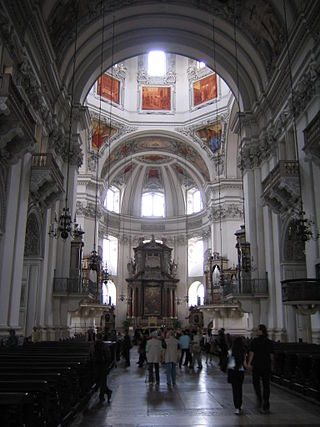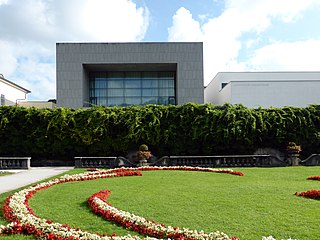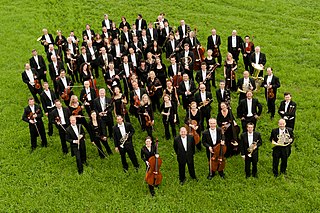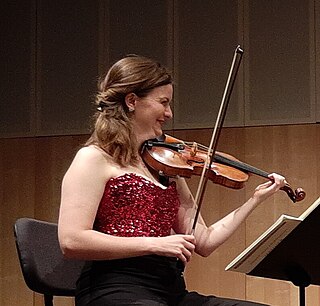
The Salzburg Festival is a prominent festival of music and drama established in 1920. It is held each summer, for five weeks starting in late July, in Salzburg, Austria, the birthplace of Wolfgang Amadeus Mozart. Mozart's operas are a focus of the festival; one highlight is the annual performance of Hofmannsthal's play Jedermann (Everyman).

Robert David Levin is an American classical pianist, musicologist, and composer. He was a professor of music at Harvard University from 1994 to 2014 and the artistic director of the Sarasota Music Festival from 2007 to 2017.

Rolando Villazón Mauleón is a Mexican operatic tenor, stage director, author, radio and television personality and artistic director. He now lives in France, and in 2007 received his French citizenship.

The Krönungsmesse, composed in 1779, is one of the most popular of Wolfgang Amadeus Mozart's 17 extant settings of the Ordinary of the Mass. While it is relatively short, Bruce C. Macintyre, writing in the Cambridge Mozart Encyclopedia, classifies it as a Missa Longa, on the basis of the festal character, size of the orchestra, which includes a substantial brass section, orchestral introductions for the movements and the setting of the intonations for the Gloria and Credo.

Mozarteum University Salzburg is one of three affiliated but separate entities under the "Mozarteum" moniker in Salzburg municipality; the International Mozarteum Foundation and the Mozarteum Orchestra Salzburg are the other two. It specializes in music, the dramatic arts, and to a lesser degree graphic arts. Like its affiliates it was established in honour of Salzburg-born musician Wolfgang Amadeus Mozart.

The Mozarteum Orchestra Salzburg is an Austrian orchestra, based in the town and state of Salzburg. The orchestra gives concerts in several Salzburg venues, including the Großes Festspielhaus, the Great Hall of the Stiftung Mozarteum. In addition to symphony orchestra concerts, the orchestra serves as accompanying ensemble for operas and musical theatre performances at the Salzburg State Theater.

Marc Minkowski is a French conductor of classical music, especially known for his interpretations of French Baroque works. Minkowski was musical director of Mozartwoche in Salzburg, Austria, from 2013 to 2017 and was general director of the Opéra national de Bordeaux from 2016 to 2021. Minkowski is a Chevalier du Mérite.

Karl Thomas Mozart was the second son and the elder of the two surviving sons of Wolfgang and Constanze Mozart. The other was Franz Xaver Wolfgang Mozart.
The Mozart Medal is an award administered by the Mozarteum International Foundation. It derives its name from Wolfgang Amadeus Mozart. The medal is available in three metal types: gold, silver, bronze.

Veronika Eberle is a German violinist.

Ingrid Haebler was an Austrian classical pianist.

Christiane Karg is a German operatic soprano. The award-winning singer became known for performing Mozart roles at the Salzburg Festival, and made an international career.

Mozart's birthplace is the birthplace of Wolfgang Amadeus Mozart at No. 9 Getreidegasse in Salzburg, Austria. The Mozart family resided on the third floor from 1747 to 1773. Mozart himself was born here on 27 January 1756. He was the seventh child of Leopold Mozart, who was a musician of the Salzburg Royal Chamber.
Wolfgang Plath was a German musicologist specialising in research on Wolfgang Amadeus Mozart.

Martin Grubinger is an Austrian drummer and multi-percussionist.

Wolfgang Rehm was a German musicologist active mostly in music publishing, especially the Neue Mozart-Ausgabe. He was on the board of its editorial team for decades, and personally edited operas and piano music. While he worked on it for Bärenreiter in Kassel, he was responsible for the program of the Kasseler Musiktage festival, and after he moved for further work to Salzburg, he shaped the program of the Mozart Week. He was also a member of the International Association of Music Libraries, Archives and Documentation Centres from 1959 to 1985, and also a founding member and treasurer of the Répertoire International des Sources Musicales data base.
Gerhard Croll was a German-Austrian musicologist.
Rudolph Kurt Angermüller was a German musicologist, who rendered great services to Mozart studies in particular.
Lukas Johannes Hagen is an Austrian violinist and music educator.
The Mozart Week is a classical music festival centred on Wolfgang Amadeus Mozart, held every year in his native Salzburg. It was created in 1956 on the 200th anniversary of his birth, and coincides with his birthday 27 January, lasting in fact slightly over a week.














